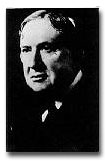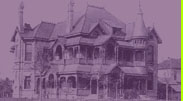GREAT CITIZENS - GOVERNOR WILLIAM P. HOBBY
 William Pettus Hobby, editor, publisher and twenty-sixth governor of Texas, was born March 26, 1878 in Moscow, Texas, one of six children of Eudora Adeline (Pettus) and Edwin E. Hobby. He moved to Houston with his family when he was fifteen and, in 1895, began working for the Houston Post as a circulation clerk, later becoming a business writer. In addition he became involved in politics and, with others, founded the Young Men's Democratic Club of Houston. In 1904, fellow party members elected him Secretary of the Democratic State Executive Committee. Meanwhile at the Post, he rose to the position of city editor before leaving the Houston newspaper in 1907 to manage the Beaumont Enterprise. A part owner of that paper, Hobby soon bought the Enterprise outright.
William Pettus Hobby, editor, publisher and twenty-sixth governor of Texas, was born March 26, 1878 in Moscow, Texas, one of six children of Eudora Adeline (Pettus) and Edwin E. Hobby. He moved to Houston with his family when he was fifteen and, in 1895, began working for the Houston Post as a circulation clerk, later becoming a business writer. In addition he became involved in politics and, with others, founded the Young Men's Democratic Club of Houston. In 1904, fellow party members elected him Secretary of the Democratic State Executive Committee. Meanwhile at the Post, he rose to the position of city editor before leaving the Houston newspaper in 1907 to manage the Beaumont Enterprise. A part owner of that paper, Hobby soon bought the Enterprise outright.
In 1914 and again in 1916, Texans elected Hobby as lieutenant governor of the state. On August 25, 1917, at the age of 39, Hobby became the youngest man to hold the office of governor when in a special session, the Senate impeached Governor James E. "Pa" Ferguson in his second two-year term. In 1918, Hobby soundly defeated Ferguson, and continued to serve in the governor's office for four years, until January 18, 1921.
Hobby's administration is remembered for the increased state support of public schools, and the passage of laws providing aid to farmers. He appointed the first State Highway Commission in 1917, and established the oil and gas division of the Railroad Commission. Educational milestones included stronger compulsory school attendance laws, free textbooks for public schools and increased aid to rural schools as well as increased general school apportionment.
In March 1918, Hobby called a special session of the Texas legislature to enact women's suffrage laws in Texas. Later, the State Supreme Court upheld this act. Thus women were able to vote in Texas' July, 1918 primary, nearly a year before Texas became the first state in the South and the ninth in the Union to adopt the Nineteenth Amendment to the U.S. Constitution.
Instrumental in obtaining loans for farmers affected by severe droughts in 1917 to 1918 in middle West Texas, Hobby's administration also signed into law legislation establishing a quarantine against the pink bollworm, and initiating payments to farmers whose cotton crops suffered damage from the pest.
After his terms as governor, Hobby returned to the Beaumont Enterprise, purchasing in addition the Beaumont Journal. In 1924, he became president of the Houston Post-Dispatch, continuing in that position after Ross S. Sterling sold the paper to J.E. Josey in 1931. In 1929, Hobby's first wife, Willie Cooper, died. Two years later, he married the local Houston beauty, Oveta Culp.
In 1939, Hobby purchased the Houston Post. Under his guidance it grew, both in circulation and in prestige. Radio station KPRC and television station KPRC-TV, were also part of the Houston Post Company. In 1955, Hobby became board chairman of the Houston Post.
Hobby died in Houston on June 7, 1964, at the age of 86. Three years after his death, the old Houston International Airport, located seven miles south of downtown, was renamed Hobby Airport in his honor.






